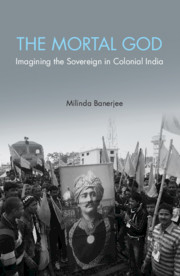Book contents
- Frontmatter
- Dedication
- Contents
- Acknowledgements
- Note on Transliteration
- Abbreviations
- Note on Documents Used
- Introduction
- 1 ‘Caesar of India’: Debating the British Monarchy and Colonial Rulership
- 2 ‘State is the Household Vastly Enlarged’: Imagining Sovereignty through the Princely States
- 3 ‘One Law, One Nation, One Throne’: Debating National Unity
- 4 ‘One has to Rule Oneself’: Collectivising Sovereignty in Peasant Politics
- 5 ‘God's Kingdom Has Come’: Messianic Sovereignty in Late Colonial India
- Conclusions and Further Thoughts
- Index
Conclusions and Further Thoughts
Published online by Cambridge University Press: 13 September 2018
- Frontmatter
- Dedication
- Contents
- Acknowledgements
- Note on Transliteration
- Abbreviations
- Note on Documents Used
- Introduction
- 1 ‘Caesar of India’: Debating the British Monarchy and Colonial Rulership
- 2 ‘State is the Household Vastly Enlarged’: Imagining Sovereignty through the Princely States
- 3 ‘One Law, One Nation, One Throne’: Debating National Unity
- 4 ‘One has to Rule Oneself’: Collectivising Sovereignty in Peasant Politics
- 5 ‘God's Kingdom Has Come’: Messianic Sovereignty in Late Colonial India
- Conclusions and Further Thoughts
- Index
Summary
At the heart of this book is an interstitial, and in many ways, still enigmatic, figure: that of the sovereign. (Of course, I have studied sovereign figures in the plural, but let me for a moment linger on the word in the singular to achieve a level of generality and abstraction.) By using this term, I have sought to straddle, as well as slip in between, two conceptual spaces: that of kingship or rulership and that of sovereignty. Neither kingship nor sovereignty entirely captures the chameleon facets of the sovereign figure, at least as I have deployed it in this volume. The sovereign, as a heuristic frame of analysis, is related to categories of divine, human and messianic kingship. Certainly, many of the sovereign figures I have studied were mythical and historical kingly (and queenly) personalities, commemoratively deployed in remarkable ways across the late-nineteenth and early-mid-twentieth century in India. Yet, this book has not been a study of kingship per se; there is more to its argument than a focus on, for instance, the British monarchy or the Indian princely states. The greater weight of the book has, in fact, been borne by imagined and imaginary rulers, rulers who were almost drawn out of the mist, by a conjuror's sleight of hand, by anti-colonial nationalists or peasant actors to articulate their political demands. This book is not simply a history of modern kingship in India.
In a way, the book has been about an inexplicable excess. The surplus of divine and human regal figures in British and Indian imagination requires an explanation, especially because much of these political invocations were about far more than royal politics. To put this bluntly, many Indian nationalists or peasant politicians cared very little about trying to build any ‘real’ national monarchy. Clearly, kingship alone constitutes no adequate explanatory frame here. There was, for sure, an overarching imperial monarchy and many subordinate princely rulerships in colonial India. But the peculiarly passionate force with which many British and Indian actors (I have, admittedly, put far more emphasis on the latter than on the former) thought of rulership requires a more complex horizon of explanation. I have suggested that the category of sovereignty offers this missing interpretative link. This may seem an odd conjecture to make at first glance.
- Type
- Chapter
- Information
- The Mortal GodImagining the Sovereign in Colonial India, pp. 398 - 424Publisher: Cambridge University PressPrint publication year: 2017



